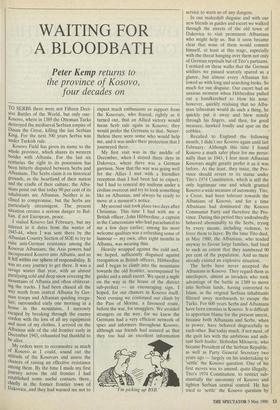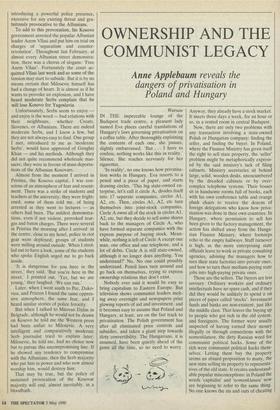WAITING FOR A BLOODBATH
Peter Kemp returns to
the province of Kosovo, four decades on
TO SERBS there were not Fifteen Deci- sive Battles of the World, but only one: Kosovo, where in 1389 the Ottoman Turks destroyed the mediaeval Serbian empire of Dusan the Great, killing the last Serbian King. For the next 500 years Serbia was under Turkish rule.
Kosovo Field has given its name to the whole province, which shares its western border with Albania. For the last six centuries the right to its possession has been bitterly disputed between Serbs and Albanians. The Serbs claim it on historical grounds, as the heartland of their nation and the cradle of their culture; the Alba- nians point out that today 90 per cent of its Inhabitants are Albanian. Neither is in- clined to compromise, but the Serbs are particularly intransigent. The present situation creates a serious danger to Bal- kan, if not European, peace.
I visited Kosovo last February, but my Interest in it dates from the winter of 194344, when I was sent there by the Albanian Country Section of SOE to try to raise anti-German resistance among the Kosovar Albanians; the Axis powers had incorporated Kosovo into Albania, and so it fell within our sphere of responsibility. It was no easy journey to get there. It was a savage winter that year, with an almost paralysing cold and deep snow covering the mountains of Albania and often obliterat- ing the tracks. I had been chased all the way north from central Albania by Ger- man troops and Albanian quisling irregu- lars; surrounded early one morning in a house in the mountains, I narrowly escaped by breaking through the enemy cordon with the loss of all my equipment and most of my clothes. I arrived on the Albanian side of the old frontier early in December 1943, exhausted but thankful to be alive.
My orders were to reconnoitre as much of Kosovo as I could, sound out the attitude of the Kosovars and assess the chances of raising an effective resistance among them. By the time I made my first journey across the old frontier I had established some useful contacts there, chiefly in the former frontier town of Dakovica, and they had warned me not to
expect much enthusiasm or support from the Kosovars, who feared, rightly as it turned out, that an Allied victory would mean Serb rule again in Kosovo; they would prefer the Germans to that. Never- theless there were some who would help me, and it was under their protection that I journeyed there.
My first visit was in the middle of December, when I stayed three days in Dakovica, where there was a German garrison. Now that the war was going well for the Allies I met with a friendlier reception than I had been led to expect, but I had to conceal my uniform under a civilian overcoat and try to look something like an Albanian, and always be ready to move at a moment's notice.
My second visit took place two days after Christmas. This time I had with me a British officer, John Hibberdine, a captain in the Cameronians who had parachuted to me a few days earlier; among his most welcome qualities was a refreshing sense of humour — my own, after eight months in Albania, was wearing thin.
Heavily wrapped against the cold and, we hoped, sufficiently disguised against recognition as British officers, Hibberdine and I began to climb into the mountains towards the old frontier, accompanied by guides and a small escort. We spent a night on the way in the house of the district sub-prefect — an encouraging sign, I hoped, for our chances in Kosovo itself. Next evening we continued our climb by the Pass of Morina, a favoured route, before the war, for smugglers. We avoided strangers on the way, for we knew the Germans had a very efficient network of spies and informers throughout Kosovo, although our friends had assured us that they too had an excellent information
picking up fl'
service to warn us of any dangers.
In our makeshift disguise and with our new friends as guides and escort we walked through the streets of the old town of Dakovica to visit prominent Albanians who might help us. But it soon became clear that none of them would commit himself, at least at this stage, especially with the threat hanging over them not only of German reprisals but of Tito's partisans. I noticed on these walks that the German soldiers we passed scarcely spared us a glance, but almost every Albanian fol- lowed us with long and searching looks. So much for our disguise. Our escort had an anxious moment when Hibberdine pulled out a handkerchief to blow his nose; however, quickly realising that no Alba- nian tribesman would do such a thing, he quickly put it away and blew noisily through his fingers, and then, for good measure, hawked loudly and spat on the cobbles.
Recalled to England the following month, I didn't see Kosovo again until last February. Although this time I found Kosovo a much safer place for me perso- nally than in 1943, I fear most Albanian Kosovars might greatly prefer it as it was before. At the least, they insist, the Pro- vince should revert to its status under Tito's 1974 Constitution, which is still the only legitimate one and which granted Kosovo a wide measure of autonomy. Tito, a Croat, had been tolerant towards the Albanians of Kosovo, and for a time Albanians had dominated the Kosovo Communist Party and therefore the Pro- vince. During this period they undoubtedly behaved abominably to the Serbs, trying by every means, including violence, to force them to leave. By the time Tito died, in May 1980, the Albanians, who tended anyway to favour large families, had bred to such an extent that they numbered 90 per cent of the population. And so there already existed an explosive situation.
The Serbs have never accepted the Albanians in Kosovo. They regard them as interlopers, almost as invaders who took advantage of the battle in 1389 to move into Serbian lands, having converted to Islam, as the original Serbian inhabitants filtered away northwards to escape the Turks. For 600 years Serbs and Albanians have been enemies in Kosovo. It is difficult to apportion blame for the present unrest, because both Albanians and Serbs, when in power, have behaved disgracefully to each other. But today much, if not most, of the guilt lies with the ambitious and mili- tant Serb leader, Slobodan Milosevic, who became President of the Serbian Republic, as well as Party General Secretary two years ago — largely on his undertaking to `settle' the Kosovo question. One of his first moves was to amend, quite illegally, Tito's 1974 Constitution, to restrict sub- stantially the autonomy of Kosovo and tighten Serbian central control. He has tried to `settle' the Kosovo question by introducing a powerful police presence, excessive for any existing threat and gra- tuitously provocative to the Albanians.
To add to this provocation, his Kosovo government arrested the popular Albanian leader Azem Vllasi and put him on trial on charges of 'separatism and counter- revolution'. Throughout last February, at almost every Albanian street demonstra- tion, there was a chorus of slogans: `Free Azem Vllasi'. Fortunately the court ac- quitted Vllasi last week and so some of the tension may start to subside. But it is by no means certain that Milosevic himself has had a change of heart. It is almost as if he wants to provoke an explosion, and I have heard moderate Serbs complain that he will lose Kosovo for Yugoslavia.
Unfortunately, Serbs seem to enjoy and enjoy is the word — bad relations with their neighbours, whether Croats, Slovenes, or Albanians. There are indeed moderate Serbs, and I know a few, but they are not always easy to find. One group I met, introduced to me as 'moderate Serbs', would have approved of Genghiz Khan — and his methods. Although they did not quite recommend wholesale mas- sacre, they were in favour of mass deporta- tions of the Albanian Kosovars.
Almost from the moment I arrived in Pristina, the Kosovo capital, I was con- scious of an atmosphere of fear and resent- ment. There was a strike of students and teachers at the university; they were fright- ened, some of them told me, of being arrested as they went to lectures — as others had been. The mildest demonstra- tions, even if not violent, provoked tear- gas and baton charges. There were several in Pristina the morning after I arrived: in the centre, close to my hotel, police in riot gear were deployed; groups of students were milling around outside. When I strol- led out to have a look, some of the students who spoke English urged me to go back inside.
'It is dangerous for you here in the street,' they said. 'But you're here in the street,' I pointed out. 'Yes, but we are young,' they laughed. 'We can run.'
Later, when I went south to Pec, Dako- vica, and Prizren I found the same oppres- sive atmosphere, the same fear, and I heard similar stories of police ferocity.
But when I talked to Milovan Djilas in Belgrade, although he would not be drawn on Kosovo he told me the Western press had been unfair to Milosevic. A very intelligent and comparatively moderate Serb journalist tried to explain later: Milosevic, he told me, had no choice now but to pursue this uncompromising line. If he showed any tendency to compromise with the Albanians, then the Serb majority who put him in power and who now almost worship him, would destroy him.
That may be true, but the policy of sustained provocation of the Kosovar majority will end, almost inevitably, in a bloodbath.



















































 Previous page
Previous page